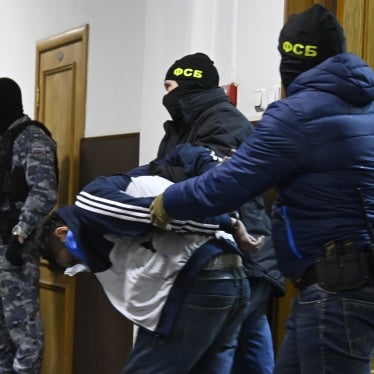Today, May 4, marks one year since Russian theater director Yevgenia Berkovich and playwright Svetlana Petriychuk were arrested. The two women, thrown behind bars on bogus charges of publically “justifying terrorism” and spreading its propaganda over an award-winning play they staged together, are facing up to seven years in prison. Though the case against them was moved to trial in April, the first hearing has been pushed back to October at the earliest.
Earlier this spring, Berkovich and Petriychuk were put on the government’s list of “terrorists and extremists,” blocking them from drawing any funds from their bank accounts, except 10,000 rubles – just over $90 – per month for basic necessities. Russian law allows this measure to be used against anyone convicted or merely suspected of terrorism or extremism-related crimes.
Many journalists and commentators suggest that the absurd case against her and Petriychuk is in retaliation for Berkovich’s bold and compelling condemnation of the war in a series of poems she wrote shortly after the full-scale invasion of Ukraine in 2022. After all, Berkovich first directed a public reading of the play in 2019. It even won the prestigious Golden Mask prize in 2022, just a few months into the invasion. But it would take another year for law enforcement to raise any issues about the play. During that time, Berkovich’s defiant poems grew in number and visibility.
The health of Berkovich’s two children has reportedly deteriorated in the course of their forced separation from her. Berkovich’s 89-year-old grandmother, the prominent writer and rights activist Nina Karteli, died seven months after her arrest.
The play, Finist the Bright Falcon, which the authorities accused of propagating and justifying terrorism, is focused on Russian women being lured into ISIS and other militant Islamist organizations by online recruiters offering to marry them. The author and director were attempting to understand and explain the reasons many women across Russia are vulnerable to ISIS recruiters.
The play is largely based on court records from the case of Varvara Karaulova, a 19-year-old philosophy student from Moscow who attempted to leave for Syria in 2015 but was arrested and eventually sentenced to 4.5 years in prison. In the play, a modified version of Karaulova’s story is interlaced with themes from Russian fairy tales. The play’s title, “Finist the Falcon,” is named after the male protagonist of a popular fairy tale in which a young woman overcomes seemingly insurmountable obstacles for them to be together.
I have watched online the very reading of the play on which the charges are based. While it aims to explore the tragedy of women who feel worthless being lured into ISIS by promises of love and a bright future, it contains no elements of ISIS propaganda. Quite the opposite. SOVA Center, a leading Russian think-tank researching prosecutions for terrorism and extremism, also examined the play closely and found no evidence it justified terrorism. Despite this, the prosecution and the dubious experts they invoked to support their case choose to equate an attempt to expose the root causes of terrorism with its justification.
It is not the first time that Russian authorities have conflated these two distinct issues. In a notorious 2021 case Svetlana Prokopyeva, an independent journalist from Pskov, was ordered to pay a hefty fine on bogus terrorism charges for arguing that Russia’s repressive policies on speech and assembly radicalized young people. Before the verdict, her ability to travel was restricted for a year. Her name was placed on the “terrorists and extremists” list, and her assets were frozen.
As recently as in February this year, Boris Kagarlitsky, a university professor and editor-in-chief of the Marxist online publication Rabkor was handed a draconian sentence of five years in prison on charges of “justifying terrorism” in a social media post in which he merely suggested that the 2022 attack on the Kerch strait bridge that connects occupied Crimea with Russia was unsurprising “from the military viewpoint.”
Kagarlitsky, like Berkovich, is a well-known opponent of Russia’s war in Ukraine. It is notable that the first sentence the court handed him was a fine of 600,000 rubles ($6,570). But the prosecutors appealed, claiming the verdict was excessively lenient.
With Berkovich and Petriychuk behind bars for a whole year, and the Kremlin’s zero-tolerance war on critics and free expression, it is hard to be optimistic about the outcome of their case. But this should not be about optimism. What matters is that the Kremlin has an obligation to free these women, who have done nothing wrong, and to stop retaliating against its critics. It is everyone’s moral calling to show solidarity with them.









